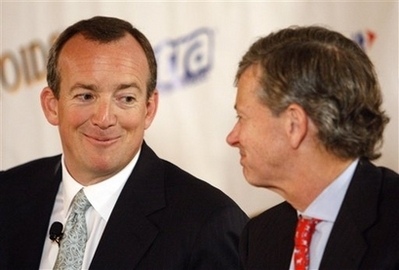Mars buying gum maker Wrigley with financing from Buffett
(Agencies)
Updated: 2008-04-29 15:05
Updated: 2008-04-29 15:05
CHICAGO -- The Oracle of Omaha is betting that the country's candy jar is recession-proof.
With financing from Warren Buffett, candy maker Mars Inc. on Monday said it is buying confectioner Wm. Wrigley Jr. Co. for an estimated $23 billion in cash. The deal would marry brands that sweet-toothed Americans have munched on for decades: Mars owns Snickers and M&Ms; Wrigley's gum brands include Juicy Fruit, Orbit, Extra and Big Red.
"A good time to buy a really great business is when you can do it," Warren Buffett said on CNBC Monday, adding that he understands Mars and Wrigley better than the balance sheets of most major banks.
|
|
Buffett's Berkshire Hathaway Inc. will purchase a $2.1 billion minority equity interest in the Wrigley subsidiary once the deal is completed. The Omaha, Neb.-based company also offered $4.4 billion of subordinated debt to fund the deal.
"In terms of Warren Buffett's sweet spot, these are exactly the kind of brands that he wants," said Jet Hollander, a former candy industry executive who is president of the snack food consulting firm Pre-Eminence Strategy Group.
If the buyout receives regulatory and shareholder approval, the combined companies would leapfrog over Britain's Cadbury Schweppes as the world's largest confection maker -- a move that's already fueling speculation that the buyout could spawn a round of candy industry consolidation.
"I look at it as two companies that see the opportunity to create a true global confectionary powerhouse," said Morningstar analyst Mitchell Corwin. "They become No. 1 in chocolate and No. 1 in chewing gum with a strong international presence and growth in emerging markets."
Under the agreement, shareholders at Chicago-based Wrigley would receive $80 in cash for each share. Mars will also assume less than $1 billion of Wrigley debt.
Executives said family owned Mars first began eyeing Wrigley in January and approached the company with their unsolicited bid in April 11. Since then, the two sides have haggled to reach the $80-per share offer -- a 28 percent premium to Wrigley's Friday closing price of $62.45.
Monday's announcement sent Wrigley's shares into overdrive, reaching an all-time high.
"I think this is a bold move, but beyond that, I think this is the right move," said Wrigley Chief Executive Bill Perez.
After the buyout is completed in six to 12 months, Wrigley would become a subsidiary of McLean, Va.-based Mars. Its headquarters will stay in Chicago, where the business has operated since it was founded by the Wrigley family in 1891. The Wrigley family will no longer hold any equity in the company.
"I have talked to some family members and I anticipate that they all will be very supportive of this, because it makes sense for really everybody," said Bill Wrigley Jr., the company's executive chairman and the fourth-generation family member to lead the business. "It's not just about selling out for dollars. It is more about what is the right thing and how can we grow going forward."
The company's name has been synonymous with Chicago for decades. The gum maker's ornate towering headquarters along the Chicago River is a favorite among tourists for snapping pictures. And the Chicago Cubs historic ballpark — Wrigley Field — got its name while the team was owned by the Wrigley family, which sold the franchise decades ago.
Executives said Wrigley would gain little benefit in weathering a run-up in commodities costs, but said the deal would allow the company to enhance its sales, marketing and distribution systems.
Among the early changes after the deal is complete, Wrigley would take over control of Mars' non-chocolate candy, including Starburst and Skittles.
Wrigley said the impact the company's 14,000 employees would be minimal. Wrigley will remain executive chairman and officials said the company's executive team would likely stay in place.
Officials said Wrigley's board, which unanimously approved the $80-per-share offer over the weekend, would examine any other offers submitted to the company.
But Citigroup analyst David Driscoll said he thought a competing offer would be unlikely.
"The only other likely buyer that we believe would benefit from acquiring Wrigley would be Hershey; but we view this as an unlikely outcome given the current situation," he told investors in a research note.
The Hershey Co. has struggled with flattening sales and rising commodity costs since late 2006 as it spends heavily to expand its overseas presence and cut back its work force in North America.
Meanwhile Monday, Wrigley said its first-quarter profit rose 18 percent, thanks to strong sales in Eastern Europe and Asia and a weakened U.S. dollar.
The company earned $168.6 million, or 61 cents per share during the January-through-March quarter. That's up from $142.7 million, or 52 cents, last year. Revenue climbed 16 percent to $1.45 billion last year. Analysts polled by Thomson Financial expected a profit of 55 cents per share on revenue of $1.39 billion.
Wrigley shares rose $14.46, or 23.2 percent, to close at $76.91.
|
||
|
||
|
|
|
|
